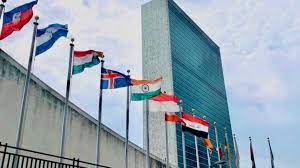Non-traditional security issues are challenges to the survival and well-being of peoples and states that arise primarily out of non-military sources.
Non-traditional security challenges:–
-
- Terrorism and violent extremism.
-
- Transnational organised crime.
-
- Irregular migration and human trafficking.
-
- Environmental degradation.
-
- Climate change
-
- Resource scarcity.
-
- Epidemics and pandemics.
-
- Natural disasters.
-
- Food shortages.
-
- Drug Trafficking.
These challenges can destabilise countries, destroy the social fabric and risk derailing peace processes or progress on peace and security especially in fragile countries.
These dangers are often transnational in scope, defying unilateral remedies and requiring comprehensive – political, economic, social – responses, as well as humanitarian use of military force.
Common Characteristics:-
-
- The threats are transnational in nature with regards to their origins, conceptions and effects.
-
- They do not stem from competition between states or shifts in the balance of power, but are often defined in political and socioeconomic terms.
-
- Non-traditional security issues such as resource scarcity and irregular migration cause societal and political instability and hence become threats to security.
-
- Other threats like climate change are often caused by human-induced disturbances to the fragile balance of nature with dire consequences to both states and societies which are often difficult to reverse or repair.
-
- National solutions are often inadequate and would thus essentially require regional and multilateral cooperation.
-
- The referent of security is no longer just the state (state sovereignty or territorial integrity), but also the people (survival, well-being, dignity) both at individual and societal levels.
Aspects: Collective Dealing
Over time, various aspects of these non-traditional security challenges have received varying levels of attention.
Multilateral peace operations are not necessarily being considered to deal with non-traditional challenges.
UN is mandated to take on various tasks linked to the consequences of these challenges.
Advantages. There are clear advantages in multilateral peace operations taking on tasks linked to non-traditional security challenges. One of the advantages is the availability of resources and established logistics. UN has agencies and specialised organisations for dealing with non-traditional security challenges. It also has a capacity for retaining institutional memory.
Disadvantages. The disadvantage is that the multilateral peace operations are already overstretched. Multilateral peace operations are generally deployed for shorter periods, whereas, non-traditional security challenges, require long-term investment and commitment. Budget availability is another challenge.
Depending upon the challenges, their area of influence and effects, either global or regional organisations would be suited to deal with them.
Regardless of which organisation is mandated, it is important to collaborate, cooperate and coordinate with all the actors involved (all components of the organisation, national partners, host government, civil society, international/external actors and global/regional organisations).
The tasks and division of labour need to be spelt out clearly without any ambiguity.
Recommendations
-
- Develop policies on dealing jointly with non-traditional security challenges.
-
- Operationalise dealing structure and mechanism.
-
- Set up multi-country and multi-organisational cooperation forums.
-
- Strengthen coordination mechanisms.
-
- Resort to joint analysis, planning, training, implementation and evaluation.
-
- Increase awareness about these operations.
-
- Allocate adequate budget and resources.
Coming up:- detailed article on the subject.
Suggestions and value additions are most welcome
For regular updates, please register here:-
References and credits
SIPRI
To all the online sites and channels.
Disclaimer:
Information and data included in the blog are for educational & non-commercial purposes only and have been carefully adapted, excerpted, or edited from sources deemed reliable and accurate. All copyrighted material belongs to respective owners and is provided only for purposes of wider dissemination.


